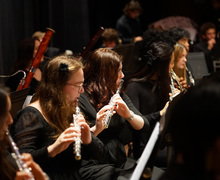Wordle creates a sense of community during a time of online divisiveness
Yiwei He | Illustration Editor
Amid the heated political discussions and divisive moral debates on social media, Wordle acts as an outlet for unity.
One of the ways I try to keep up with my younger brother while at Syracuse University is through social media. So you can imagine my surprise when one day, I noticed he had tweeted a combination of black, yellow and green boxes to his Twitter feed. I ignored it at first, thinking it was a part of some inside joke he had with his friends. But after about a week I finally had enough of these mysterious posts and I soon came across the internet phenomena known as Wordle.
In all honesty, I originally did not find the concept to be anything special. I couldn’t find the entertainment in waking up every morning to guess a five-letter word — it seemed too easy. But as I saw more people in my life become enthralled by the game, I began to feel left out. So naturally, I undertook the daily challenge.
I have never been this competitive in my life. In a matter of days, I switched from viewing Wordle as another internet craze that will die down in a week to obsessing over maintaining my streak and fretting over whether or not I solved the puzzle in fewer guesses than my friends.
My entire morning routine has been altered, and it is all because of a seemingly simple game.
I am not alone. Wordle has taken over the internet. It feels like everyday someone has an opinion to share on the daily puzzle. Even off-shoots have been created to satisfy people’s need for more once they solve the original, including SU’s own version of the game renamed as “Ottle.” This leads me to wonder: What is different about Wordle? How has it managed to remain in the public eye for as long as it has?
After numerous days of scrolling through Twitter and sharing my Wordle grids with others, I think I have come up with an answer: community. There is nothing inherently divisive about guessing a five-letter word each morning. Sure, there is a naturally competitive aspect to the game, but at the end of the day you will not lose a friend over it. It can serve as a dose of healthy competition — a substitute for a potentially more controversial use of the internet.
Wordle could not have entered our lives at a more perfect time. Typically, social media platforms such as Twitter and Facebook are breeding grounds for political debate and divisive discussion over what is morally right and wrong.
Although many of these topics involve important discussions that absolutely require attention, the nature in which they take place often becomes very toxic and ultimately contributes to a lack of unity when we need it the most. Wordle’s simple nature and ability to bring people together through the discussion of strategy and competition is refreshing and goes to show how internet conversation can be when people engage in the sharing of ideas instead of forcing them onto one another.
Wordle, at its core, is a game designed to keep us entertained for at most 10 minutes. But when we examine it on a larger scale, it serves to show how we can bring out the best in humanity. The Wordle phenomena will most likely one day make way for a new online craze, but until that day comes, we should treasure the small moments of online unity it provides us amongst the daily posts of hatred and toxicity. The idea that Wordle could potentially stand for something greater may seem bizarre and incredibly over-thought, but it is a concept that deserves to be explored for the sake of trying to focus on the bright side of life.
Grace “Gray” Reed is a freshman magazine, news and digital journalism major. Their column appears bi-weekly. They can be reached at greed04@syr.edu.
Published on March 21, 2022 at 10:03 pm






